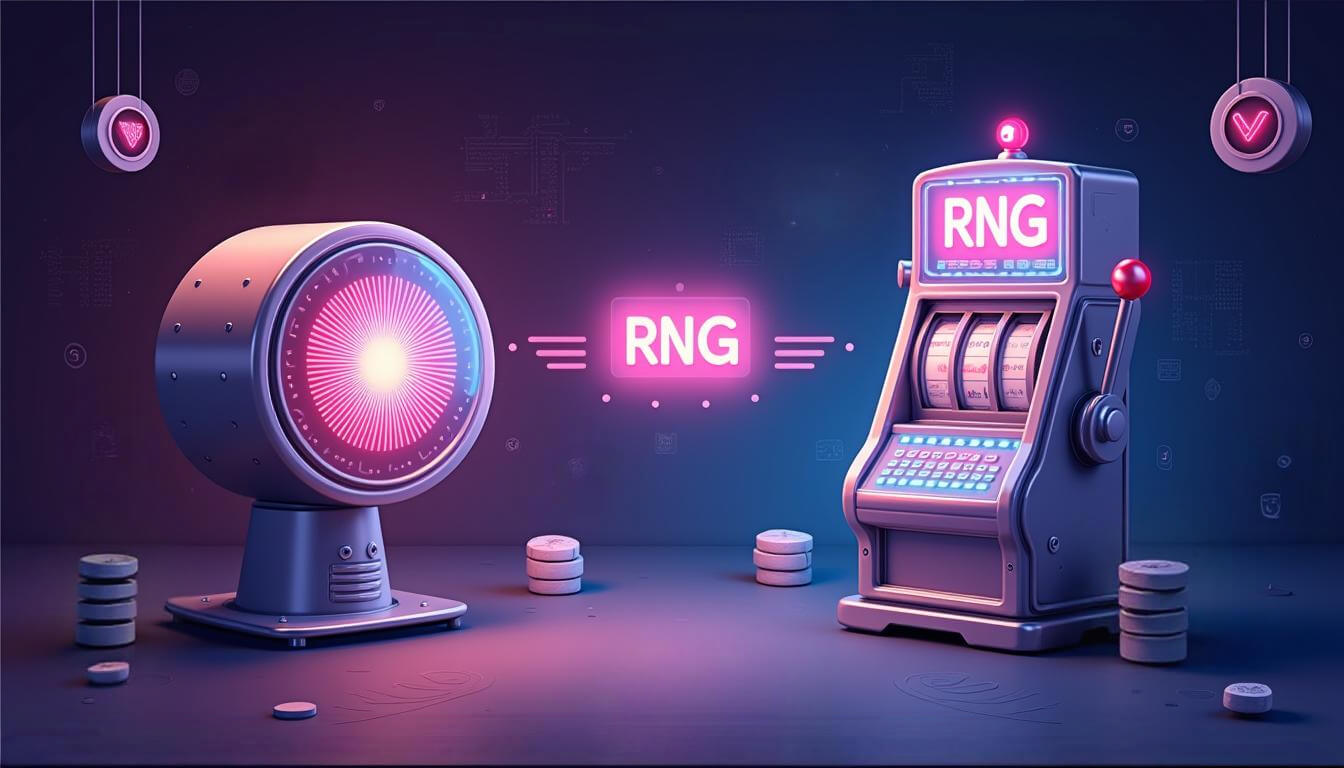Key Takeaways
- Random Number Generators ensure randomized game results
- Random Number Generators prohibit manipulation and predictability
- Regulatory bodies check RNGs before approving licenses.
Introduction to Random Number Generators (RNGs)
Spinning slot reels is a game of luck. Therefore, it depends on Random Number Generators (RNGs) for fair outcomes. RNGs are hardware or software mechanisms that produce random values to ensure unpredictability and fairness.
Live casino results are shown in real time. However, game categories like slots and table games rely on Random Number Generators to ensure fair play. That way, players are assured the online gambling platform didn’t interfere or adjust the game outcomes.
Top game providers like Pragmatic Play include RNGs in their games, promoting fairness.
Two Types of Random Number Generators
From experience, Random Number Generators come in two types:
Pseudorandom Number Generators (PRNGs)
This RNG is algorithm-based. It’s software programmed to produce random number sequences. This happens through a given condition or value, called a seed. Simply put, this RNG version doesn’t need an external influence to produce results. All that’s required is the seed number.
The seed is a key that defines possible outcomes from the PRNGs. Therefore, it’s the first value the algorithm considers to determine the outcomes. Note that this algorithm’s results don’t usually come in numbers but as images.
True Random Number Generators (TRNGs)
Unlike PRNGs, True Random Number Generators (TRNGs) are hardware-based. It also relies on unpredictable physical processes, such as atmospheric noise.
Simply put, TRNGs generate randomness through a mechanical process. However, this physical device depends on some environmental indicators to deliver unexpected results.
For context, TRNGs access a player’s number of presses on a slot machine and air temperature. It also does this via atmospheric pressure over an extended time to produce randomized outcomes.
The hardware takes measurements and converts them into values. That way, it produces the final results, which aren’t predictable.
Both RNGs work to ensure fair outcomes. However, many online casinos use PRNGs for efficiency while maintaining fairness.
How RNGs Work in Online Gambling
Random Number Generators (RNGs) are mechanisms that ensure slot game results are randomized. The software uses mathematics and game evaluations to generate random numbers.
RNG game results begin with a value called seed. From there, the mathematical evaluations create a new random number. This process keeps repeating for a series of numbers.
Each random result starts with the initial seed number. Online casinos depend on these simulations to ensure transparency and fairness.
This RNG software algorithm is constantly being evaluated through statistical tests. That way, players know that every table game and slot offers fair results. This promotes the casino and provider’s integrity.
Some popular independent third-party agencies that test RNG software include Gaming Labs International (GLI). There’s also iTechLab and eCommerce Online Gaming Regulation and Assurance (eCOGRA). Certifications from these bodies at an online casino increase players’ trust in fair game outcomes.
Importance of RNGs for Fairplay
Random Number Generators are important for an enjoyable gambling experience. You wouldn’t want to play at a site that tampers with their game results. Looking for reasons to prioritize online casinos with proven RNGs? Here are the top benefits:
Guaranteed fair outcomes
RNGs ensure fair outcomes. As you know, online casinos don’t tamper with or predetermine game results. You’re guaranteed a randomized outcome when you spin the reel or play table games.
Prevents manipulation and predictability
Random Number Generators ensure online casinos won’t be able to manipulate game results. Also, players can’t predict outcomes. This removes the undue advantage of one party over the other while playing popular games like Aviator, slots, and table games.
Online gambling loses credibility without RNGs, and players’ trust dwindles. While game outcomes are unpredictable, you’re assured that the RNG doesn’t have favorites.
Ensure compliance with regulatory standards
Licensing bodies require Random Number Generators to ensure the site doesn’t manipulate game results in its favor. That’s why online casinos partner with game testing agencies like iTechLab, eCOGRA, and Gaming Lab International (GLI).
These testing bodies check the casino’s Random Number Generators (RNGs). Seals from these agencies boost confidence amongst players. That’s because it shows game results are indeed randomized.
Common Misconceptions About RNGs
Like everything that involves gambling online, players sometimes have a few misconceptions. For context, many gamblers believe RNGs are rigged for casinos. However, this is untrue, as there’s no way any outside party, including a casino, manipulates a correctly implemented RNG.
Another myth is that players predict RNG patterns. While Random Number Generators produce a sequence, it’s still unpredictable. Therefore, the digit the RNG chooses next is unpredictable.
Lastly, some players believe slot machines like Hot Hot Fruit are hot and cold, depending on the recent payout history. However, this isn’t true, as game results are still due to the RNG software producing randomized outcomes.
Therefore, even if a slot machine pays out repeatedly, it doesn’t mean results are predictable, as further outcomes might end in losses.
Note that licensed casinos undergo regular audits to verify their RNGs’ integrity.
Regulatory Standards and Testing of RNGs
To ensure an online casino’s RNGs are in top condition, gambling platforms regularly subject their Random Number Generators to testing from reputable agencies like eCOGRA, iTechLab, or GLI.
Since third-party bodies audit and certify these slot machines, including free slots, and other games, players are assured of transparency, increasing their confidence while playing on the site.
Some of the tests game auditing agencies perform on RNGs are:
- Chi-square: This statistical hypothesis test measures an RNG’s goodness via chi-squared distribution.
- Diehard Tests: These are a series of examinations performed to determine a generated number’s randomness.
- Examination of Compilation and Source Code: Here, the testing agency verifies the RNG’s internal state, non-repeatability, and minimum seeding. This test also includes checking shuffling and scalability. Then, resolving issues before compiling the source code.
Online casinos that undergo these tests from reputable bodies like eCOGRA, GLI, or iTechLab enjoy more trust from players. Before signing up at gambling platforms, we also check for these certifications.

